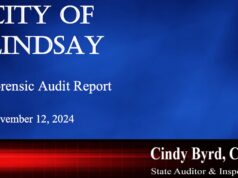

Upon State Auditor & Inspector Cindy Byrd’s release today of an audit regarding State Department of Health procurements during the early months of the pandemic, Oklahoma Gov. Kevin Stitt admitted “there were technical errors” made when purchasing personal protective equipment that the audit determined was never received.
“OSDH did not have a comprehensive emergency procurement policy or procedure in place prior to the COVID-19 emergency, greatly increasing the state’s risk for fraud, waste, and loss of funds,” Byrd’s team wrote in the audit. “As a result, prepayments were made in violation of the Oklahoma Constitution and goods have still not been received for over $5.4 million paid by the state.”
The public release of the investigative audit (embedded below) became a source of renewed criticism recently when The Frontier reported last week that Attorney General John O’Connor had declined to release the document. Former Attorney General Mike Hunter had requested the audit April 28, 2020, and Byrd had submitted it to Hunter’s office May 21, 2021, five days before he resigned unexpectedly. O’Connor was appointed in late July, and Byrd said she met with O’Connor about the audit Aug. 4.
Julie Pittman, deputy general counsel to O’Connor, released a statement Wednesday regarding the new attorney general’s decision not to release the audit himself.
“The Office of the Oklahoma Attorney General conducts ongoing investigations into matters which may lead to civil litigation or criminal prosecution or simply the closing of a file,” Pittman said. “The attorney general may request an investigatory audit as part of an investigation. Per the attorney general’s common practice and statutory authority, our office does not release investigatory audits which are part of the investigatory file.”
Asked if O’Connor’s office considered the OSDH situation an ongoing investigation, press secretary Madelyn Sheriff answered affirmatively.
“We have multiple cases ongoing that were referred to in the audit,” Sheriff said. “These cases are all at different stages in litigation, to ensure the state’s interests are protected.”
Sheriff said Byrd did not contact the attorney general prior to releasing the audit. Andrew Speno, a spokesperson for Byrd’s office, provided NonDoc with an email to O’Connor timestamped 10:15 a.m. Wednesday alerting him that she was planning to release the audit, which she did about three hours later. In the email, Byrd said she had consulted with Stitt on Tuesday.
Also on Tuesday, the new multi-county grand jury empaneled by O’Connor’s office convened for its first three-day session.
Byrd released a statement saying her office had received a request under the Open Records Act seeking the audit and that her legal counsel “concluded there is no Oklahoma statute that gives any state official the authority to withhold this information.”
“I believe all public records should be open and easily accessible to the taxpayers,” Byrd said. “This audit is an inspection of existing public records. Consequently, my final audit report is neither confidential nor exempt from the Open Records Act. I feel compelled, both legally and ethically, to release the full audit report to the public. Oklahoma taxpayers paid for it — they should get to see it.”
Stitt released his statement on the matter shortly after Byrd released the audit:
First, I appreciate the hard work and thorough investigation conducted by Auditor Byrd and I continue to be fully committed to transparency in state government.
COVID was an unprecedented crisis across the world. From the beginning my top priority has been to protect the health and safety of Oklahomans. In early March 2020 we were one of the first states to shut down nursing homes to protect the most vulnerable, saving countless lives. To keep hospitals open and our frontline workers safe, I issued executive orders to get PPE to our state as quickly as possible. Looking back today, we can acknowledge that there were technical errors while still knowing we did everything we could to protect citizens of this state during an unimaginable time.
Lastly, I am grateful to Attorney General John O’Connor for working with OSDH and fighting to ensure the state receives the money it is owed.
Had Hunter not resigned in late May 2021, his 2020 request for an OSDH audit could have marked his second bite at the apple regarding alleged mismanagement of funds at the long-beleaguered state agency.
In 2018, Hunter held a press conference with then-State Auditor & Inspector Gary Jones to announce that the multi-county grand jury had found no crimes related to OSDH’s bizarre fiscal implosion in 2017. Hunter and Jones discussed a report from the grand jury recommending that the Legislature clarify statutes related to the fiscal issues found at the agency. No legislative action was taken on the recommendations.
Findings from the new OSDH audit
Byrd’s 26-page audit of the Oklahoma State Department of Health is embedded below. When Hunter requested the audit, he specified three objectives.
Byrd’s first objective in the audit was to “determine if PPE paid for by wire transfer was received.” On that objective, her office detailed five findings:
- Finding 1: Supporting documentation could not be provided to indicate that PPE was received;
- Finding 2: Regarding the pre-payment for PPE, advancing payments violates Article 10 of the Oklahoma Constitution;
- Finding 3: One-time purchases in excess of the allowable $250,000;
- Finding 4: The cabinet secretary for health did not have had the authority to delegate purchasing authority;
- Finding 5: Inadequate controls regarding the PPE inventory system.
Byrd’s second objective was to “determine if administrative expenditures and contracts were properly procured according to the Central Purchasing Act.”
The audit included one finding on that question: “The Sole Source justification may be questionable.”
Byrd’s third objective was to “determine if salaries were reasonable based on the position.” The audit said Byrd’s office had “no findings” related to salaries, but they did note the commissioner of health’s salary being increased twice to the amount of $335,160.
“With the exception of the commissioner’s salary, which is significantly higher than the director’s at OHCA and DHS, all salary increases were justified based on the position, and the salaries appeared reasonable based on the comparative analysis to the same position at OHCA and DHS.”
Read the full OSDH audit
(Update: This article was updated at 5:25 p.m. Wednesday, Feb. 9, to include additional information regarding communications between Byrd and O’Connor.)




















